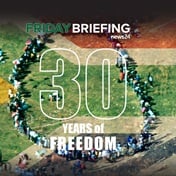
The past can become a haunting presence in the present and something that robs us of the possibilities of the future. Leslie van Rooi reflects on a moment that provided a view of the possibilities and realities of South Africans' futures.
During our recent Human Rights Day celebrations, I thought about how, in the context of students at South Africa's universities, Sharpeville and its history often seem very far removed from their everyday campus-related realities.
In particular, the dreadful day of 21 March 1960 is often only remembered as part of a fading history lesson taught at school.
Of course, this is not to deny that the lived experience of many students today is of such that the inequality of our past remains vividly and painfully part of their current realities.
I often bring up historical moments, especially around our public holidays, in class and in conversations in the Simonsberg Residence at Stellenbosch University (SU), where I serve as residence head, to see what students know about these significant holidays. And so, I did it again this year. But, given the EFF-led attempt to force a national shutdown leading up to Human Rights Day, the conversation on this recent topic quickly turned towards a discussion on the EFF and other realities of our current context. And perhaps this is as it should be. After all, 1960 is 63 years ago, and by any standard, South Africa is a remarkably different country today.
A meaningful reflection
Late on Human Rights Day, I found myself in the dining hall of our residence. Through the large windows, I could see a group of guys playing soccer on the lush open grass in front of the residence – the voorgras. I walked to the voorgras and sat on the memorial bench right in front of the residence, where I was soon joined by our vice-primarius (deputy head student).
Together with a group of guys looking from their windows on the second floor, we cheered on the players. And as we looked and supported, we realised that it was perhaps the best and most meaningful reflection that we could have had on Human Rights Day. This is so because we realised that it was quite special and significant to see several guys from various walks of life, each with his own story, fighting it out on the voorgras.
READ | OPINION: Bouwer van Niekerk - Free State racist attack - the importance of tolerance
But we also recognised the diversity that we sometimes struggle to see. The diversity that just was not possible or even legal, back in 1960. Here, during a friendly soccer match, guys from all walks of life were having fun together. South Africans, Namibians, guys who grew up in townships and who were hesitant to come to SU, as well as queer and straight guys. The primarius (head student) was in a team mostly made up of first-year students, and some of the other residence leaders teamed up with guys from various fields of study. Gone are the days of strict and false hierarchies. There are guys from Bellville, Alexandra (Johannesburg), the Cape Flats and the Karoo. And, of course, there were a variety of language communities in both teams: Afrikaans, Sesotho, isiXhosa, English, Shivambu, Kaaps, to name a few. All playing together. No majority, no minority. Equals fighting it out on the voorgras of their residence.
I reminded the vice-primarius, himself an alumnus of a prominent Afrikaans boys' school in Pretoria, about the story of one of the players who came to SU despite his family and friends warning him of the possible racism that he might encounter here. He decided to enrol, but after the first couple of days wondered whether he would indeed fit in. After an inspirational chat with a senior student at the time, he decided to stay. And this year, he serves as one of the leaders who welcomed a group of newcomers to the residence. Through openly sharing his story, he helped a new generation of students in Simonsberg Residence to find their place. More importantly, he helped these guys to find each other.
It is important to point out that the picture and stories mixed together while guys played soccer on the voorgras are not perfect or complete.
Ongoing complexity
After the guys finished playing, they were confronted with the realities of their own stories – stories sometimes far removed from that of their fellow students. But it is most definitely a picture and story far removed from the man-made fears, segregation, and seclusion of the past. And that is always worth acknowledging – especially on Human Rights Day.
The ongoing complexities of the stories of a generation of young leaders must compel us to do and be better – also us as a residence community. Diversity, as a gift, should not be underestimated. Not now, and most definitely not in a year or two, when these guys enter the world of work.
READ | Mondli Makhanya: Eradicate the racism virus
And in a real sense, these residences and academic buildings, built in the 1960s in a South Africa that was very different from the one we live in now, can and should provide the platforms to enable us to realise the possibilities enshrined in our Constitution. This is part of the role that higher education should fulfil.
As a church historian, I firmly believe that the past should be remembered, studied and reflected on. And, to do this properly, we should remember that we can only study the past through our own set of lenses – lenses often far removed from the realities of the particular subject. We do so because it is of immense value to learn from the past – also to understand our current and future realities (and possibilities).
But the past remains the past. In its most painful sense, it can become a haunting presence in the present and thus, something that robs us of the possibilities of the future. The brief moment on the voorgras provided a view of the growing possibilities and realities of our futures as South Africans. It puts the past in the past without washing and wishing it away. Going forward, we should continue to strive for this. Even if we don't always get it right.
- Dr Leslie van Rooi is the senior director: social impact and transformation and head of Simonsberg Residence at Stellenbosch University.
Disclaimer: News24 encourages freedom of speech and the expression of diverse views. The views of columnists published on News24 are therefore their own and do not necessarily represent the views of News24.




 Publications
Publications
 Partners
Partners
























